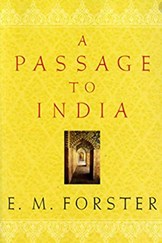A WRITER'S WIT |
My Book World

Forster accomplishes so much in this novel first published in 1924. It is one of those books that, because of the author’s elegant but subtle insights, is timeless. Readers feel as if they are there in Chandrapore experiencing the British condescension towards Indians, experiencing the many geographical and topographical wonders, observing or participating in the various religious sects, which bubble up against one another yet are a bit tolerant of one another. It is against this rich backdrop that the novel’s tension unfolds. When a young Doctor Aziz first meets Mrs. Moore, a British visitor, it is in a mosque. Before thinking, he chastises her for not having removed her shoes, but quickly apologizes when she states that she already has done so. They strike up a friendship for she is anxious to befriend the Indians, to understand their beautiful land, and Doctor Aziz is only too pleased to oblige her.
Forster also limns an Indian which is a stranger to us today, by way of Doctor Aziz. He is at by turns arrogant, defiant, then apologetic, childlike in his seeking of British approval, then ashamed, as a grown man that he has sunk so low. Since the British left India a long time ago, Indians have had time to regain or reframe their national profile while perhaps holding onto certain institutions the Brits left behind. In any case, cultures clash when Doctor Aziz, unconfident and really unwilling, is put in a position to take Mrs. Moore and her young female companion, Miss Quested, on a tour of Marabar Cave. It is a bitter irony that the expedition which he organizes explodes in his face, when something dark happens to Miss Quested in the cave, something for which Aziz is held directly responsible.
The novel’s end provides an intriguing closure, when Aziz and his hard-won British friend (who’s moved back to England) returns to Chandrapore in the future for a visit. They have become quite fond of one another yet can never seem to consummate their friendship. The last paragraphs of the novel seems to sum up their 1924 dilemma:
“‘Why can’t we be friends now?’ said the other, holding him affectionately. ‘It’s what I want. It’s what you want.’
But the horses didn’t want it—they swerved apart: the earth didn’t want it, sending up rocks through which riders must pass single file; the temples, the tank, the jail, the palace, the birds, the carrion, the Guest House, that came into view as they issued from the gap and saw Mau beneath: they didn’t want it, they said in their hundred voices, ‘No, not yet,’ and they sky said, ‘No, not there.’” (362).



 RSS Feed
RSS Feed